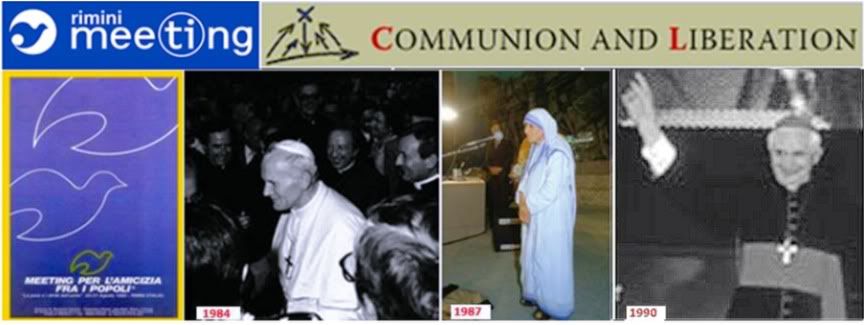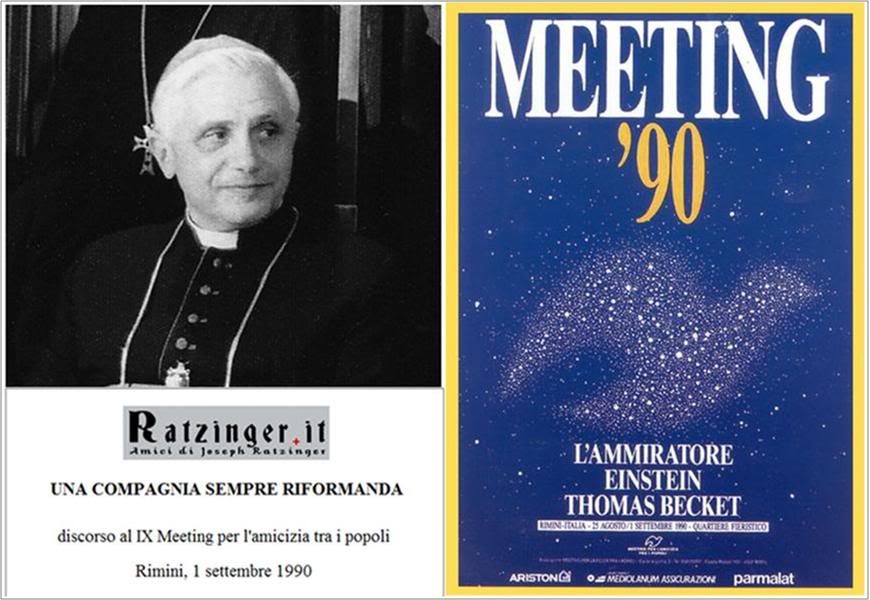| | | OFFLINE | | Post: 25.372
Post: 7.867 | Registrato il: 28/08/2005
Registrato il: 20/01/2009 | Administratore | Utente Master | |
|

 Benedict XVI to the 33rd Rimini Meeting:
Benedict XVI to the 33rd Rimini Meeting:
'Man must purify himself of false infinities'
The annual weeklong Meeting for Friendship among Peoples organized yearly by the movement Communione e Liberazione in the northeast Italian resort town of Rimini begins tomorrow, and the organizers have posted the message sent by Benedict XVI to this year's meeting. The reflection reads like a beautiful homily, very appropriate for the Meeting's opening Mass tomorrow, Sunday, when it will be read.. Here is a translation:
To my Venerated Brother
Monsignor FRANCESCO LAMBIASI
Bishop of Rimini
I wish to extend my heartfelt greeting to you, to the organizers and all the participants of the Meeting for Friendship among Peoples which has reached its 33rd year.
The theme chosen for this year - "The nature of man is a relationship with the infinite" - is particularly significant in view of the imminent start of the Year of Faith which I decreed to mark the 50th anniversary of the opening of the Second Vatican Council.
To speak of man and his yearning for the infinite means first of all to acknowledge his constitutive relationship with the Creator. Man is a creature of God. Today, this word "creature' seems almost out of fashion: The preference is to think about man as a self-fulfilling being and absolute master of his own destiny.
-
To think of man as a creature seems 'inconvenient' because it implies an essential reference to something else, or better, to someone else - not under man's control - who defines his identity in an essential way. It is a relational identity, whose first given is man's original and ontological dependence from He who wanted us and created us.
And yet this dependence, which modern contemporary man has been trying to free himself, does not just hide or diminish but reveals in a luminous way the grandeur and supreme dignity of man, who is called to life in order to enter into a relationship with life itself, with God.
To say that "the nature of man is his relationship with the infinite" means that every person was created so that he can enter into a dialog with God, with the Infinite.
At the start of the history of the world, Adam and Eve were the fruit of an act of love by God, made in his image and likeness - their life and their relationship with the Creator coincided: "God created mankind in his image; in the image of God he created them; male and female he created them" (Gen 1,27).
And original sin had its ultimate root precisely in our original progenitors withdrawing themselves from this constitutive relationship, wishing to take the place of God, believing they could do without him.
But even after sin, there remains in man an aching desire for this dialog, almost as if it was a sign branded on his soul and his flesh by the Creator himself. Psalm 63(62) helps us to enter into the heart of the matter: "O God, you are my God - it is you I seek! For you my body yearns; for you my soul thirsts, In a land parched, lifeless, and without water" (v 2).
Not just my soul, but every fiber of my flesh is made to find peace and realization in God. This tension is incancellable in the heart of man. Even when he rejects or denies God, the thirst for the infinite that inhabits man does not vanish.
Instead, there begins s labored and sterile search, of 'false infinities' that could satisfy at least for a moment. The thirst of the soul and the yearning of the body that the Psalmist speaks of cannot be eliminated. And thus man, without knowing it, is reaching out for the infinite, but in the wrong directions - in drugs, in disordered sexuality, in totalizing technology, in success at any cost, and even in deceptive forms of religiosity.
Even the good things that God has created as ways that lead to him often run the risk of being absolutized and thus become idols that replace the Creator.
To acknowledge that one is made for the infinite means following a path of purification from what I have called 'false infinities', a path of conversion of the heart and the mind. It is necessary to eradicate all the false promises of infinity that seduce man and thus enslave him.
In order to truly find himself and his true identity, to live up to the level of his being, man must return to acknowledging that he is a creature, dependent on God. Acknowledgment of this dependency - which is basically the joyous discovery of being children of God - brings the possibility of a life that is truly free and full.
It is interesting to note how St. Paul, in the Letter to the Romans, sees the opposite of slavery not so much in freedom but in our sonhood, in having received the Holy Spirit that makes us adopted children of God and allows us to cry out to him, "Abba! Father!" (cfr 8,15).
The Apostle of the Gentiles speaks of a 'bad' slavery - to sin, to the law, to the passions of the flesh. But to these, he does not oppose autonomy but rather 'the slavery of Christ" (cfr 6,16-22). , describing himself as "Paul, servant of Jesus" (1,1) .
The fundamental point, therefore, is not to eliminate the dependency, which is constitutive of man, but to direct it to Him who alone can make us truly free.
At this point, a question arises. Is it not perhaps structurally impossible for man to live up to the level of own nature? And is his yearning towards the infinite not a condemnation that he senses but can never totally satisfy?
This question brings us directly to the heart of Christianity. In fact, the infinite itself, to give an answer that man can experience, took on a finite form. The Incarnation, the moment when the Word became flesh, nullified the unbreachable distance between the finite and the infinite: the eternal infinite God had left his heaven and entered time and immersed himself in human finiteness. After which nothing is banal or insignificant in the journey of life and the world.
Man is made for an infinite God who became man, who took on our humanity to draw it towards the grandeur of his divine being. Thus we discover the truest dimension of human existence, that to which the Servant of God Luigi Giussani [founder of C&L] continually called attention: life as vocation.
Everything, every relationship, every joy, as well as every difficulty, finds its ultimate reason in being an occasion of relationship with the Infinite - the voice of God which continually calls is and invites us to lift our gaze, to discover in adherence to him the full realization of our humanity.
"You made us for yourself," Augustine wrote, "and our heart is restless until it finds its rest in you" (Confessions I(, 1,1). We should not fear what God asks of us through the circumstances of life, even if it is the dedication of all oneself in a particular form of following and imitating Christ in the priesthood or religious life.
The Lord, calling each of us to live totally in him, demands that we acknowledge the essence of our proper nature as human beings: that we were made for the Infinite. God has at heart our happiness, our full human realization.
Let us therefore ask to enter and remain with this outlook of faith that has characterized the saints, in order to discover the seeds of good that the Lord sows along the journey of our life and adhere with joy to our vocation.
While I hope that these brief thoughts may be of help to those who are taking part in the meeting, I assure everyone of my nearness in prayer, and I hope that the reflections from these days may introduce everyone to the certainty and joy of the faith.
To you, Venerated Brother, to the officials and to the organizers of the meeting, as well as to all present, IO gladly impart a special Apostolic Blessing.
From Castel Gandolfo
August 10, 2012
[IMG]http://i601.photobucket.com/albums/tt96/MARITER_7/B16-FIRMA.jpg/IMG]
Back in 2009, I posted my translation of the text delivered by then Cardinal Ratzinger to the 1990 Rimini meeting. You may find it on this page of the Forum:
You may find it on this page of the Forum:
freeforumzone.leonardo.it/lofi/TEXTS-BY-JOSEPH-RATZINGER/D8759...[Modificato da TERESA BENEDETTA 19/08/2012 14:40] |